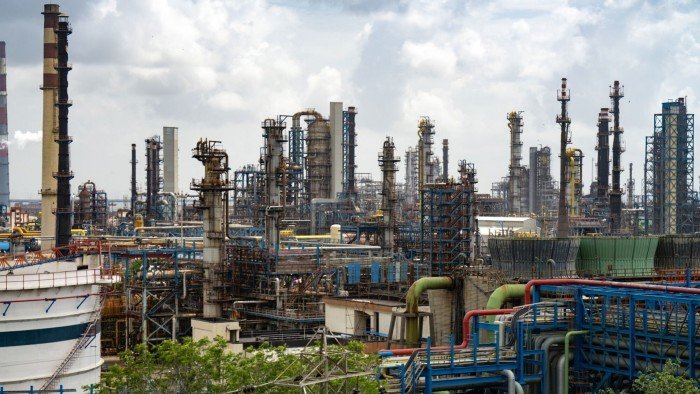India is holding firm on its long-standing ties to Moscow as US President Donald Trump’s administration readies punitive tariffs over New Delhi’s purchases of Russian oil.
Hopes are dimming that Trump, who threatened to double levies on Indian exports to 50 per cent last month over New Delhi’s purchases of Russian oil, will lower or postpone the tariffs before a Wednesday deadline.
A planned visit to New Delhi by US trade negotiators this week was called off, Indian officials said. A draft notice published on Monday said the extra tariff would hit Indian goods after at 12.01am on Wednesday, eastern US time.
Amid the stalemate with Washington, top Indian officials have made a series of recent trips to Russia. Foreign minister Subrahmanyam Jaishankar met President Vladimir Putin last week in Moscow, where Indian national security adviser Ajit Doval was also warmly received. Putin is expected to visit India later this year.
New Delhi and Washington are playing at “who will blink first”, said Chietigj Bajpaee, senior research fellow for South Asia at Chatham House.
Meanwhile, India has continued buying Russian crude, albeit in lesser quantities. Russian crude loadings to India are currently at about 1mn barrels per day, according to ship tracking data compiled by Kpler, down from as high as 2mn b/d earlier this year.
“There’s no official directive from the Indian government to cut Russian volumes — so for now, it’s business as usual,” Sumit Ritolia, lead analyst at trade consultancy Kpler in New Delhi.
But he added that refiners were “being cautious” and were “actively exploring alternatives” to Russian oil, pointing to possible supplies from the US, west Africa, Latin America and the Middle East.
Ritolia added that it was still too early to confirm a rerouting trend, noting that August crude exports from Russia to India would only be reflected in shipment data from next month onwards.
New Delhi has struck a defiant tone in the face of Trump’s tariff threats, saying that “the targeting of India is unjustified and unreasonable”.
But trade minister Piyush Goyal told a forum in the Indian capital on Friday that Prime Minister Narendra Modi’s government would keep an “open mind, a positive outlook and the confidence that India-US relationship is very consequential . . . to both the countries”.
India has become Moscow’s largest buyer of seaborne crude since Putin’s full-scale invasion of Ukraine in 2022, importing nearly $140bn worth of Russian oil, government data shows. Much of that supply is processed by Indian refiners into petrol and diesel that is sold into domestic and international markets.
Western countries — including the US — encouraged the trade, which helped maintain global market prices, as long as it remained below the G7 price cap set to limit Russian revenues.
But Trump administration officials such as trade adviser Peter Navarro have since accused Indian companies of being “profiteers” of Moscow’s war.
“The US is questioning our sovereignty to decide who to buy oil from,” said Amitabh Singh, associate professor at Jawaharlal Nehru University’s Centre for Russian and Central Asian Studies. “We would be happy if Saudi Arabia or Iraq give us at the same price, or at a lesser price, than Russia, because this is purely a commercial decision.”

The US is India’s largest trading partner, with two-way trade in goods worth more than $130bn in the financial year ended in March — about double the comparable figure for Russia, at $68bn, of which $50bn was Indian oil imports.
Instead, Moscow’s significance to New Delhi is underpinned by strategic relations that date back to the cold war.
“There is a political comfort in the relationship with Russia which is quite different from the flip-flops and the cyclical relationships we’ve had with the Americans,” said Pankaj Saran, former Indian ambassador to Russia.
Russia has long been India’s largest supplier of arms from fighter jets to warships, accounting for more than 60 per cent of New Delhi’s weapons purchases since 2000, according to the Stockholm International Peace Research Institute.
Indian officials have defended their right to buy Russian oil, insisting that it has never been the direct subject of sanctions, unlike Iran and Venezuela. Should India stop buying Russian oil, New Delhi could face an additional $3bn-5bn in annual import costs, according to analysts.
In Moscow, Jaishankar said New Delhi was “very perplexed” by the US position, noting that Washington had not singled out other major buyers of Russian oil such as China.
To Indian officials, such inconsistency points to a broader fallout between the sides and a cooling of the personal relationship between Modi and Trump, who not long ago hailed one another as “friends”.
“We are the country, which, actually, the Americans have said for the last few years that we should do everything to stabilise the world energy market, including buying oil from Russia,” he said.
Data visualisation by Haohsiang Ko in Hong Kong
India Business Briefing
The Indian professional’s must-read on business and policy in the world’s fastest-growing big economy. Sign up for the newsletter here

